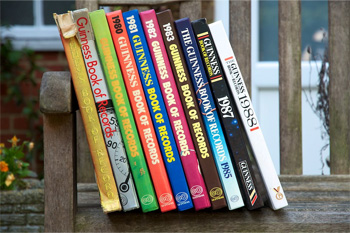5 Tiny Groups Of Nobodies That Are Shockingly Powerful

Conspiracy theorists drone on and on about the secret groups who really control the world -- the Illuminati, the Jews, the Skull and Bones, the Rothschilds, the Jews, the Vatican, the shapeshifting reptile people, the Jews, etc. Well, it turns out that there actually are hidden groups that surreptitiously control aspects of your daily life. It's just that you haven't heard about them. Generally, the folks secretly manipulating the world are big on that "secret" part. Spoiler alert: It's not the Jews. Jews are not a secret.
The U.S. Medical Industry Is Controlled By 31 People
If you live in the U.S., you know healthcare is wildly expensive. Or maybe you don't. Because you're dead. From not being able to afford healthcare. Supposedly, this is all a natural consequence of the free market doing its job. Who can control that market? It is so wild. So free. Like a majestic Palomino prancing in a glade.
In reality, the price of medical procedures is almost entirely decided by 31 people, all sitting in a room together and throwing darts at a bingo card.

Above: an artist's impression of the room.
The American Medical Association Specialty Society Relative Value Scale Update Committee (nicknamed RUC, because AMASSRVSUC is an abominable Elder God summoned to our plane by successfully pronouncing his unwieldy name) consists of a mere 31 physicians, each representing one of the different medical specialties, but all tasked with deciding what literally everything they do should cost. You might have heard of this practice before, but using different words -- in basically any other industry, it's known as "price fixing," the culprits are called "cartels," and the whole thing is incredibly illegal. In the case of American medicine, it's standard government-approved practice.
Here's how it works (or rather, "works"): The committee assigns every medical procedure a number of relative value units (RVU), which account for the amount of work a doctor performs, the costs to the practice, and malpractice liability.

The ARM (arbitrary random markup) is built into each value automatically.
And though the RUC technically only makes "suggestions," the Centers for Medicare and Medicaid Services (CMS) accept the committee's recommendations 90 percent of the time. Private insurance companies in turn base their negotiations on whatever CMS pays through Medicare. In a healthcare system dominated by fee-for-service payment models, physicians' pay is based on how many RVUs they produce. Three types of specialist -- orthopedic surgeons, neurosurgeons, and general surgeons -- are members of the "Two Million Club," meaning each type of physician makes, on average, more than $2 million a year for their hospital, based on their RVUs.
Interestingly, assigning RVUs is a zero sum game; if the RUC wants to increase RVUs for one procedure, they need to decrease it for others. Needless to say, the arguments can get pretty heated, since the members know they are essentially negotiating their salaries. Specialists absolutely dominate the RUC. As a result, the committee is partly responsible for the gap in pay between specialists and primary care physicians. This has led to a shortage of primary care physicians in the U.S., and an emphasis on complex procedures at the expense of preventive health measures. RVU assignments may also explain why 15 minutes became the standard amount of time for each doctor appointment. Typical wellness visits are not given very high RVUs, so doctors are pressured to crank through patients like Pringles.

A child's smile, though, is priceless!
(It is worth nothing.)
Fine Restaurants Succeed Or Fail On The Word Of A Tire Company
For the past half century, restaurants all over the world have bowed to the power of one small, omnipresent cartel: Michelin. Yes, you've heard of them. You probably assumed the name was unrelated to the tire company, but if so, you were mistaken. For some reason, a tire company decides the fate of fine dining.

To be fair, their expert does look like he's had some experience with eating.
Michelin's unlikely influence in the world of high-class cuisine began in 1900, when hardly anyone owned a car. They started publishing the Michelin Restaurant Guide as a free brochure that mapped the best restaurants in France (their home country), using a three-star rating system. The rather flimsy subtext was "You could visit any of these places right now if you had a car. A car with tires. Specifically, our tires." It was a cheap, desperate gimmick, and it didn't really matter.

It was like that time a beer company put out a trivia book, and everyone responded reasonably.
But over the next hundred years, Michelin continued to publish its annual guide, and its standards began to evolve. Today, earning a single Michelin star is the restaurant equivalent of winning an Oscar. Having two means you're one of the top dining establishments in the entire world. Three Michelin stars means you're the kind of place Bill Gates has to budget for, and you're serving meals that Caligula would call "a little over the top."
So who decides the rating of all these restaurants? Well ... nobody knows. Their reviewers are anonymous. Even the company executives don't know their names or what they look like. Very rarely will a Michelin reviewer grant an interview, and it's always given with strict instructions to obscure all personal information. Severe penalties are given to any establishment that tries to fish for some. Nobody knows how many reviewers even exist, or what their training is. And since they're completely unaccountable, there's no way of knowing whether they even ate at any damn place or just hand out stars to their chef buddies.

All we know is they're presumably really good at changing tires.
Nevertheless, the Michelin Guide is such a huge deal that losing a Michelin star can easily bankrupt a restaurant. In fact, at least two world-renowned chefs have committed suicide after discovering that their rating had been downgraded. That's quite a lot of power for a few connoisseurs to have, considering that, technically speaking, they work for a damn tire company.
A Small Town In Macedonia Influences American Elections
We've all been in a panic lately about foreign powers maliciously influencing the American presidential election. And while most fingers are being pointed squarely at Russia, nobody seems to be looking at Macedonia, a tiny country in Eastern Europe that's influenced more elections than Putin could shake a stick at. And he's a stick-shaker, that guy.

But calling him that breaks Russia's law against gay propaganda.
Though President Trump has made every effort to define "fake news" as anything he doesn't like, from The New York Times to a particularly difficult word jumble (some of the words go diagonally, Donny!), fake news is a real problem. In the run-up to the 2016 election, social media was swamped with false viral news stories, and when the real media tried to trace them to their sources, they discovered that most of them were, weirdly enough, coming from the small Macedonian town of Veles, which has a population of around 50,000.
The teenagers and young adults of Veles have become rich off an entire cottage industry of fake news, having set up around 100 websites dedicated to making up stories about American politicians and sharing them on Facebook for ad revenue. And when we say rich, we mean these kids are making upwards of $100,000 a year from Google Ads -- all in a town where the average annual wage is around $4,800.

Its next-biggest industries are turnip farming and begging.
According to the young men in question, they don't have any ideological reason for focusing on pro-Trump articles -- those are simply the ones that succeed. During the election campaign, they also tried making up pro-Hillary and pro-Sanders bullshit, but people weren't sharing it. In Veles, new nightclubs have opened this year just for local youths to spend their money on. The impoverished streets are now lined with brand-new BMWs, all purchased with ad revenue from viral articles they wrote about Hillary Clinton being diagnosed with Ebola and Trump having a secret Iron Man suit.
Half Of The World's Opioid Supply Comes From One Valley
The U.S. and Canada are currently dealing with one of the biggest drug crises of all time. Drug-related deaths are higher than ever before, particularly from opioids like heroin, opium, morphine, codeine, and OxyContin. These drugs all come from the seeds of one plant: the opium poppy. And by sheer volume, almost all of those plants come from one place: Afghanistan.

Which is weird, because when has anything bad ever come out of Afghanistan?
Not only does Afghanistan produce almost 90 percent of the world's poppy extract -- both the good stuff that gets delivered by a doctor in a hospital and the bad stuff that gets delivered by a guy named "Docta" in the alleyway behind Arby's -- but fully half of that 90 percent comes from a single valley: Helmand Province.

Those fields aren't grass.
The poppy seed trade in Afghanistan is so massive that it accounts for around 15 percent of the country's GDP, and although poppy seeds are also a non-mind-altering culinary ingredient, the bulk of this annual harvest doesn't wind up sprinkled on a disappointing muffin. Afghanistan has the biggest drug economy in the world, leaving even South America's cocaine industry in the dust and making Pablo Escobar's empire look like a Kickstarter project.

We hope this doesn't lead to Afghanistan becoming a dangerous place sometime in the future.
The 2001 American invasion of Afghanistan only made this issue worse. The ruling Taliban had a lot of really, really shitty ideas, but one of their better ones was "zero tolerance on opium production." When the regime fell, poppy production and exports skyrocketed, despite a multi-billion-dollar effort by the U.S. to curtail it. Technically, the practice is still illegal in Afghanistan, but the government knows how much money it rakes in for the country and how well poppy farmers, uh, "tip" the authorities.
Every Beer Brand In The U.S. Is At The Whim Of One Obscure Bureaucrat
Each of the hundreds of American beer brands -- from Coors on down to the craft brew your hipster uncle whips up in his basement -- has its own unique name and label. And every single one of them has to be individually approved by one single bureaucrat. Also, he's a lunatic.
The Alcohol and Tobacco Tax and Trade Bureau's Malt Beverage Labeling Specialist is the title given to the one person in charge of approving or denying the name and label design of every single beer that is sold in America -- an industry that grossed $252 billion in 2016. Until his retirement in 2015, that person was Kent Martin, who demanded that people refer to him simply as "Battle."

That's not the crazy part. That's the awesome part.
Battle was feared like a dictator for the decade that he worked as the TTB's chief beer dude. Since there are no clearly defined regulations on what can or cannot appear on a beer label, Battle was handed the power to approve or veto the designs of one of America's biggest industries based on little more than his intuition ... and how much he likes puns. Because beer brewers seem to love them.
Battle was renowned for being irritatingly pedantic. Among those beers he vetoed, one was called "Liquid Wisdom" (rejected because "the name contains a medical claim" -- a medical claim to ... wisdom?), one featured a King of Hearts playing card (any image of a heart apparently implies a health benefit), one had a picture of a hamburger (supposedly misled customers into "thinking the beer includes a meat product" -- how ripped off would you feel if you bought it and it wasn't Baconator-flavored?), and one had a picture of Santa Claus, but according to Battle, Santa looked drunk. And Santa doesn't get drunk. That's an official government opinion.

Other labels should have been banned for implying the beverage contains alcohol.
Brewers knew that his word was law, and in all his time in office, there was only one known example of someone winning a battle against Battle. A California brewer wanted to market a beer called Weed Ale, which Battle vetoed because of the marijuana implication. But the beer was brewed in the town of Weed, CA, named after Civil War hero Abner Weed. It took an intervention from the ACLU, a senator, and goddamn Congress before Battle agreed to back down. Turns out his name wasn't just bravado -- the dude would fistfight God himself if the Almighty dared to put a Whopper on a Pilsner label.
Adam Koski took a big step toward secretly running the world when he wrote half of a fantasy book. Nathan Kamal lives in Oregon and writes there. He co-founded Asymmetry Fiction for all your fiction needs. Ryan is currently a medical student at the University of Pennsylvania. He is the host of the Penn Health-X Podcast, which focuses on healthcare management, entrepreneurship, and technology. Check out https://soundcloud.com/pennhealthxpodcast for more info!
Also check out 6 People You've Never Heard Of (Who Secretly Rule The World) and 6 Random Nobodies (Who Secretly Run The World).
Subscribe to our YouTube channel, and check out The 5 Most Hilariously Insane Ads In The History Of Local TV, and other videos you won't see on the site!
Follow us on Facebook, and we'll follow you everywhere.